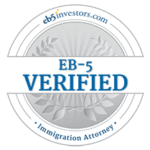Mark Urbanski is an EB-5 immigration attorney that has dedicated his practice, the Law Offices of Mark A. Urbanski, to immigration and nationality law for over 10 years, focusing on commercial and investment-based immigration matters. He specializes in providing immigration solutions to a wide array of individuals. Attorney Urbanski has obtained visas and green cards for a great number of people and represented hundreds of clients from a variety of fields, such as technology companies, academic institutions, accounting firms, hospitals, and the hospitality industry. He has advised municipalities, businesses and individuals on the creation of EB-5 Regional Centers and has represented investors for various reputable EB-5 Regional Centers.
Attorney Urbanski represents clients from across the United States and the world through his practice in Washington, D.C. and Northern Virginia. His solo practice has enabled him to offer rates far lower than most large or mid-size law firms and to provide greater individual attention and accessibility. Attorney Urbanski is fully equipped and prepared for the multifaceted and rapidly changing legal landscape and is more than able to help clients navigate the immigration process and related business matters.
Attorney Urbanski received his bachelor’s degree from Cornell University and his Juris Doctorate from the University at Buffalo, the State University of New York. Attorney Urbanski has taught courses in international law, business law and public policy as an adjunct professor at the Rochester Institute of Technology, University of Rochester, and other institutions.
Attorney Urbanski is active in numerous bar associations, including the D.C. Bar, and has been active in the American Immigration Lawyers Association (AILA) for over 10 years. He is also admitted to practice before U.S. Federal Courts in five circuits. Attorney Urbanski has presented numerous seminars at the World Bank and International Monetary Fund, served on the American Immigration Lawyers Association panel, and spoken before crowds of business frontrunners and investors abroad.
He is fluent in English, Spanish, and Italian and conversant in basic French and Mandarin Chinese.
Answers to EB-5 18 Questions Answered
- How do I know whether or not an EB-5 project is part of a Regional Center?
- Can you attract EB-5 investors outside of a Targeted Employment Area?
- Will I have to go to an embassy interview to get an EB-5 visa?
- Could a healthcare provider raise capital through the EB-5 program?
- Can I use a gift to get my EB-5 visa?
- What is the restriction on the number of Chinese EB-5 applicants?
- Is there a limit on the number of projects an EB-5 Regional Center can have?
- Can people from any country get an EB-5 visa?
- Will I have to pay taxes if I am an investor in the EB-5 visa program?
- When can I move to the United States in the EB-5 visa process?
- How can I determine if my EB-5 project will qualify for TEA designation?
- Can an EB-5 investor be employed for compensation at the business they invest in?
- Why are EB-5 investments regulated by the Securities and Exchange Commission (SEC)?
- Which family members can qualify for an EB-5 immigrant investor visa?
- Do you have to live near the EB-5 Regional Center that you invest in?
- Can I stay in the U.S. while going through the EB-5 program?
- What documents are used for the trace of funds in the EB-5 Program?
Verified EB-5 Investors
As of December 6, 2012
- EB5Investors.com found no public criminal record on BeenVerified.com
- Active BAR member in good standing
What does it mean to be a VERIFIED member of EB5Investors.com?
EB5Investors.com verifies attorney members before placing them on our directory. Not all professionals pass the verification process, and we are not paid by members in any way for verified badges. The entire verification process is performed by EB5Investors.com staff members based in Irvine, California.
We perform a background check on the member by using BeenVerified.com’s online background check tool. The BeenVerified.com criminal background database is compiled by pulling together public records. Misconduct, such as a proven criminal record, disqualifies the applicant from obtaining a verified badge from EB5Investors.com. For attorneys that practice law in the United States, a staff member also checks to make sure the attorney is in good standing with the BAR of the state they represent to practice bar in.
The Verified Badge does not mean or represent that the attorney has experience or specializes in immigration law. Please consult the State Bar or other government based sites for more information on a particular attorney.





